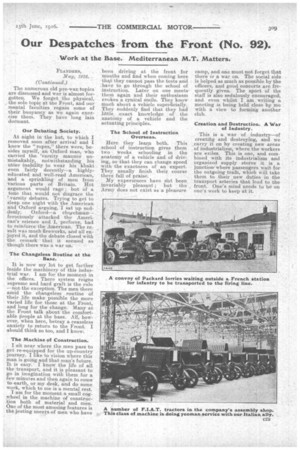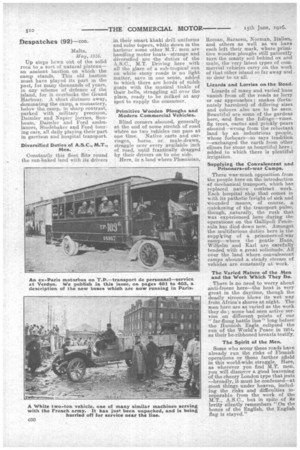Our Despatches from the Front (No. 92).
Page 5

Page 6

If you've noticed an error in this article please click here to report it so we can fix it.
Work at the Base. Mediterranean M.T. Matters.
The numerous old pre-wan topics are discussed and war is almost forgotten. We forget the physical, , the sole topic at the Front, and our mental faculties regain some of their buoyancy as we again exercise them. They have long lain dormant.
Our Debating Society.
At night in the hut, to vvhich I removed soon after arrival and I knew the " ropes' " there were, besides myself, an Oxford man, who carried the 'varsity manner unmistakably, notwithstanding his utter inability to wear his khaki even fairly decently—a highlyeducated and well-read American, and a sprinkling of men from ' various parts of Britain. Hot argument would rage ; but of a tone that would not disgrace the varsity debates. Trying to get to sleep one night with the American and Oxford arguing, I sat lip suddenly. Oxforda cht‘uchinartferociously attacked the AmeriCan's science and I, perforce, had to reinforce the. American. The result was much fireworks, and all enjoyed it, and the debate closed With the remark that it seemed as though there was a war on: The Changeless Routine at the
Base.
It is now my lot to get further inside the machinery of this industrial war. I am for the moment in the offices. There system reigns supreme and hard graft is the rule —not the exception. The men there amid the changeless routine of their life make possible the more varied life for those at the Front, and long for the change. Many at the Front talk about the comfortable People at the base. All, however, when here, betray a ceaseless anxiety to return to the Front. I 'should think so too, and I know.
The Machine of Construction.
I sit near where the men pass to get re-equipped for the up-country • journey-. I like to vision where this man is going and that man's future. It is easy. I know the life of all the transport, and it is pleasant to k-,o in imagination with them for a few minutes and then again to come to earth, or my desk, and do some work, which to me is a mental rest.
I am for the moment a small cogwheel in the machine of construction both of material and men. One of the most amusing features is the jesting sneers of men who have
been driving at the . front for 'months and tind when coming here that they cannot pass the tests and have to go through the school of instruction. Later on one meets' them again and their, enthusiasm evokes a cynical smile. They know much about a vehicle superficially. They suddenly find that they had little exact knowledge of the anatomy of a vehicle and the actuating principles.
The School of Instruction Overseas.
Here they learn both. This school of instruction gives them two weeks schooling in the anatomy of a vehicle and of driv'mg, so that they can change speed with the exactness of an expert. They usually finish their course there full of praise. . My experiences have not been invariably pleasant ; but the Army does not exist as a Pleasure
camp, and one must not forget that there is a war on The social side is helped as much as possible by the officers, and good' concerts are frequently given. The sport of the staff is also sedulously encouraged, and even whilst I am writing a meeting is being held close by me with a view to forming another club.
Creation and Destruction. A War of Industry.
This is a war of industry—of creating and destroying, and we carry, it on by creating new areas of industrialism, where the workers -are exiles. This is one, and combined with its industrialism and organized supply stores it is a junctiont. where passengers wait for
the outgoing hi tra, which will take them to their new duties in the transport arteries that lead to the front. One's mind needs to be on one's work to keep at it.
Up steps hewn out of the solid rock to a Sort of natural plateau— an ancient bastion on which the camp stands. This old bastion must have played its part in the past, for many thousands of years, in any scheme of defence of the island, for it overlooks the Grand Harbour. A short distance away, dominating the camp, a monastery, below the camp, in sharp contrast, 'narked with military precision, Daimler and Napier' lorries, Sunbeam, palmier and Ford ambulances, Studebaker and Ford touring cars, all daily playing their part in garrison and hospital transport.
Diversified Duties of A.S.C., M.T., Men.
Constantly this fleet it round the stin-baked land with its drivers
in. their smart khaki drill uniforms and solar topees, while down in the harbour some other M.T. men are handling motor boats—strange and diversified are the duties of the A.S.C., M.T. Driving here with all the glare of a sub-tropical sun on white stony roads is no light matter, save in one sense, added to which there are herds of mulch goats with the musical tinkle of their belle, straggling all over the place, ready to be milked at any spot to supply the consumer.
Primitive Wooden Ploughs and Modern Commercial Vehicles.
Blind corners abound, generally at the end of some stretch of road wh6re no two Vehicles can pass at one time. Native carts and carriages, horse, or mule-drawn, straggle ouer every available inch of road, until frantically dragged by their drivers on to one side.
Here, in land where Phcenibian, Roman, Saracen, Norman, Italian, and others as well as we have each left their mark, where primitive wooden ploughs still patientI7 turn the scanty soil behind ox and mule, the very latest types of cora ' mercial vehicles carry on the work of that other island so far away and so dear to us all.
Lizards and Lorries on the Road. Lizards of many and varied hues vanish from off the roads as lorry or car approaches ; snakes (fortunately harmless) of differing sizes and colours also 'are to be seen. Beautiful are some of the gardens here, And fine the foliage—vines, fig trees, cactus and prickly pears abound—wrung from the reluctant land by an industrious people, whose forbears—so says tradition —exchanged the earth from other climes for stone so bountiful here ; added to which there is plentiful irrigation.
Supplying the Convalescent and Prisoners-of-war Camps. There was-much opposition from the people here on the introduction ef mechanical transport, which has replaced native contract work. Each hospital ship that comes in with its pathetic freight of sick and wounded means, of course, a quickening of the transport pulse, though, naturally, the rush that was experienced here during the operations on the Gallipoli Peninsula has died down now. Amongst the multifarious duties here is the suppVing of a prisoners-of-war camp—where the gentle Hans, Wilhelm. and Karl are carefully tended with a great solicitude. All over the land where convalescent camps abound a steady stream of vehicles are constantly at work.
The Varied Nature of the Men and the Work Which They Do. There is no need to worry about i anti-freeze here—the heat s very great in the daytime, though the deadly sirocco blows its wet way frolo. Africa's shores at night. The men here are as varied as the work they do ; some had seen active service on different points of our " far-flung battle line" long before the Flunnish Eagle eclipsed the sun of the World's Peace in 1914, as their be-ribboned breasts testify. The Spirit of the Men. Some who scour these roads have
already run the risks of Flemish operations or those farther afield in this world-wide struggle. Here, as wherever you find M.T. men, you will discover a good leavening of the cheery London type that jests —broadly, it must be confessed—at most things under heaven, including the risks and difficulties inseparable from the work of the M.T., A.S.C., but in spite of its levity silently remembers "On the bones of the English, the English flag is stayed."




















